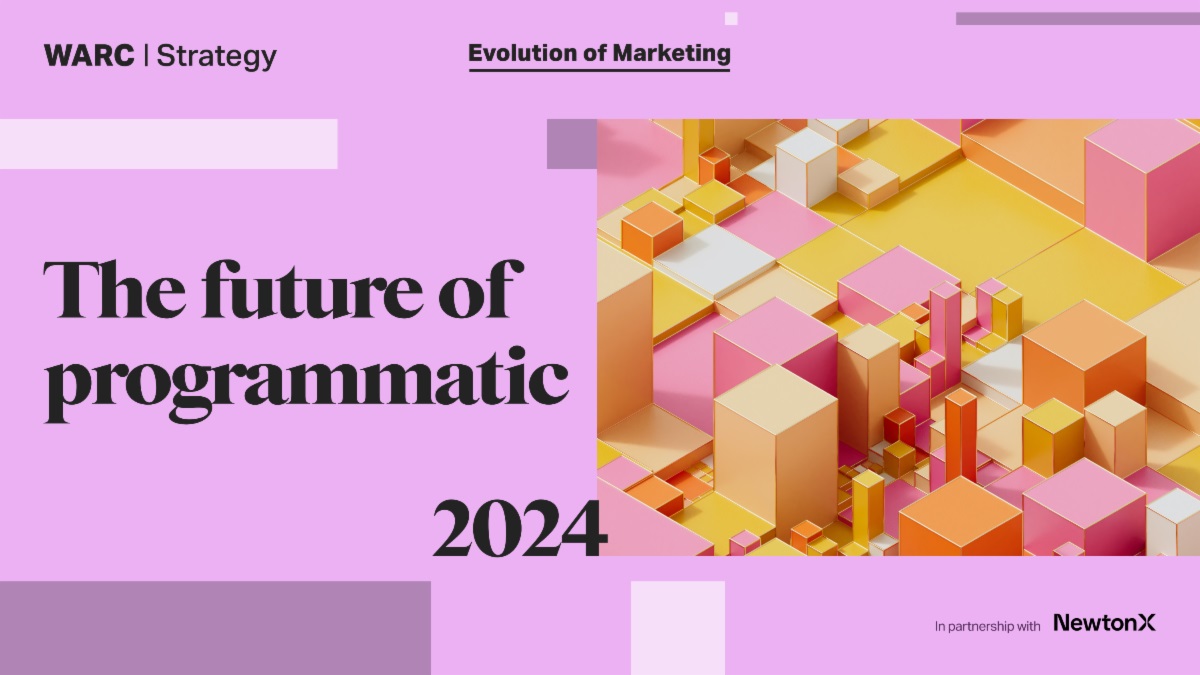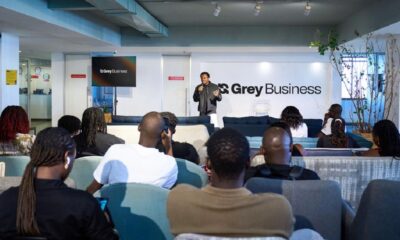- More than half (60%) of advertisers and agencies cite brand safety as top programmatic concern
- New survey-led research by WARC and NewtonX explores major trends in programmatic
14 August 2024 – WARC has today released The Future of Programmatic 2024, a report covering the major trends shaping programmatic advertising over the coming 12 months, together with practical guidance for advertisers evolving their programmatic and ad tech capabilities.
Programmatic advertising is digital advertising that is bought, sold and placed using automated technologies and algorithms. The report highlights key trends across five different areas: programmatic priorities and concerns, signal loss and cookie deprecation, supply chain transparency, sustainability, and spending intentions.
Findings are based on an exclusive survey of 100 programmatic experts, conducted in July 2024 by WARC in partnership with B2B market research company, NewtonX, and complemented by expert commentary and external research.
Paul Stringer, Managing Editor Research and Insights, WARC, says: “Our Future of Programmatic report arrives in the wake of the announcement from Google that third-party cookies will no longer be fully phased out from the advertising ecosystem. While it represents a reversal of sorts, this should not encourage complacency. The industry still needs to evolve to meet the demands of a privacy-first ecosystem.
“Declining addressability, brand safety and ad fraud, continue to concern marketers, and addressing these concerns becomes even more important as increasing volumes of spend are transacted programmatically each year.”
Key challenges outlined in WARC’s Future of Programmatic 2024 report are:
Brand safety tops list of programmatic concerns
Accounting for more than 70% of digital spend, programmatic channels play a critical role in helping advertisers achieve their wider marketing and business objectives.
Whilst two-thirds of advertisers and agencies surveyed are somewhat satisfied with the contribution of programmatic advertising to driving business outcomes, there is a recognition that there is room for improvement.
Much of the current dissatisfaction is rooted in concerns around brand safety. Recent reports have shown advertisers are spending millions of dollars on low-quality ad placements that violate brand safety standards.
More than half (60%) of the advertisers and agencies surveyed highlighted this issue as one of their biggest causes for concern, with 56% selecting improved advertising verification capabilities as a top priority.
Hannah Rook, Head of Intelligence and Insights, MediaBrands Magna Group, says: “Advertisers and agencies need to take a more proactive and comprehensive approach to brand safety, expanding their placement criteria to make better decisions and ensure their ads appear in appropriate and relevant environments.”
Advertisers are underprepared for a cookie-diminished world
Google will no longer be withdrawing cookies from the digital advertising ecosystem, but will nonetheless play a diminished role in the future.
Many advertisers are still struggling to adapt to this new world, despite concerns about the impact of signal loss on various areas including targeting, data access, audience segmentation and measurement. Only a quarter (25%) of survey respondents agree that advertisers are making adequate progress.
Consistent with other research, advertisers are doubling down on the collection of first-party data. More than three quarters (76%) of respondents are implementing first-party data strategies, with more than half (57%) highlighting this as the most promising solution.
Wayne Blodwell, Co-Founder and CEO, Impact Media, says: “Google’s decision to keep cookies has not changed the direction of travel for the industry. Advertisers should continue leaning into smart, cookie-free techniques like attention and econometrics to prepare for a privacy-first world.”
The industry is failing to take action on transparency
Across the programmatic advertising supply chain, ad fraud and wastage are rife. According to the ANA’s programmatic study, just 36 cents of every dollar spent on programmatic advertising reaches the consumer, and a quarter of the $88 billion spent on open web programmatic is wasted on low-quality and fraudulent ad impressions.
However, a year on from the report less than half (49%) of advertisers and agencies have established direct contracts, or taken the necessary steps to verify or audit the quality of ad impressions.
Collective action is required to urgently address these issues and clean up the ‘murky’ media supply chain.
Emissions reduction is not a priority at most (59%) companies
The programmatic advertising industry produces more than 215,000 metric tons of carbon emissions in a single month across five leading economies, according to Scope3.
To help address the climate crisis, marketers need to take more responsibility for reducing the carbon footprint of activities related to advertising. This includes programmatic, which generates significant emissions through its notoriously complex supply chain.
Nearly two-thirds (59%) of agencies and advertisers surveyed for the report say that reducing emissions generated by programmatic advertising is not a priority for their organisation. Less than a third (31%) said they had adopted a framework or set of methodologies to measure the carbon emissions from their digital advertising. Another third (34%) have taken no action at all to reduce the carbon impact of their programmatic advertising campaigns.
More than half (52%) of those surveyed cite a lack of industry-wide standards as a clear barrier to emissions reduction. Nearly half (48%) highlight a lack of knowledge / skills around reducing the carbon footprint of advertising activities.
Mark Andrews, Senior Consultant, ID Comms, says: “Some advertisers are using their media agencies to forecast carbon emissions on their media plans. This is educating planners and buyers and helps media teams think about carbon emissions as well as considering how practical decisions at the planning stage could lower emissions, without negatively impacting the effectiveness of media planning/buying.”
Open web investment decreases as walled garden spend grows
Despite evidence suggesting that the open web remains the arena in which audiences spend most of their time, investment in walled gardens appears to be growing. WARC forecasts predict that just five platforms will take over half of global advertising spend this year. Three-quarters of survey respondents (76%) say they are spending 40% or less of their budgets on open web advertising.
Advertisers and agencies are opting to spend more on programmatic direct deals (e.g. programmatic guaranteed, preferred deals) at the expense of traditional real-time bidding. More than half (56%) of respondents purchase display inventory using programmatic methods. Retail media inventory also features high on the list of channels transacted programmatically. Social and gaming are anticipated to receive largest increases in programmatic investment.
Read a sample report of The Future of Programmatic here. WARC subscribers can read the report in full. A podcast will be available from 27 August.
The report is part of WARC Strategy’s Evolution of Marketing, a content programme of in-depth forward-looking reports focusing on the future of the marketing discipline by drawing on the latest evidence, emerging trends, technologies, media, social influences and other drivers of change.


 Business4 days ago
Business4 days ago
 Business5 days ago
Business5 days ago
 Events4 days ago
Events4 days ago
 Energy3 days ago
Energy3 days ago
 Energy4 days ago
Energy4 days ago
 Events4 days ago
Events4 days ago
 Business3 days ago
Business3 days ago
 Business5 days ago
Business5 days ago













